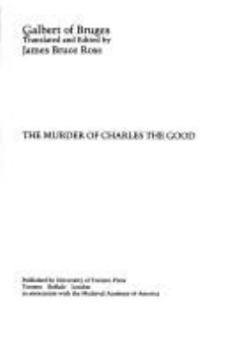The Murder of Charles the Good, Count of Flanders
Select Format
Select Condition 
Book Overview
"And it should be known that I, Galbert, a notary, though I had no suitable place for writing, set down on tablets a summary of events... and in the midst of so much danger by night and conflict by... This description may be from another edition of this product.
Format:Paperback
Language:English
ISBN:0802064795
ISBN13:9780802064790
Release Date:January 1982
Publisher:University of Toronto Press
Length:364 Pages
Weight:0.95 lbs.
Dimensions:1.0" x 6.0" x 9.0"
Customer Reviews
1 rating
An amazing first hand account of the Rise of Communes
Published by Thriftbooks.com User , 17 years ago
The events of 1127 surrounding the murder of count Charles the Good of Flanders, provided an opportunity for the forceful assertion of independence by Flemish cities. The author, Galbert of Bruges, provides a vivid event-by-event first hand account as history is unfolding. He chronicles the crisis that directly caused the murder of Charles the Good. An event that was caused in part by the Count's attempt to reduce the powerful Erembald clan to their legal place as serfs along with the interference of the Barons, who initially support the Erembald clan but seized the advantageous position as the instrument of revenge for the Count's murder in order to seize his wealth. They besieged the supporters of the Erembald clan, camped out in Bruges, only with the permission of the Burghers of the city and the entire region whom in the power vacuum that ensued, forcefully asserted their independence and economic interests. The translator's introduction and notations are immensely revealing and insightful. She (James Bruce in this case is a woman's name) explains the rise of the commercial agglomerations of burghers and their vital need for peace in order to prosper in trade. This lead to the Church's peace and eventually the count's circumvention the Church and proclamation of a Count's peace since he also reaped the benefits of the growing trade in the form of tolls and taxes. The rebellion and murder that ensued is a result of the dislike by the traditional powers, the barons and others and powerful peasant families of the Count's use of 'new-men' in his circle of advisors. She also elaborates extensively on the key medieval concept of the importance of the oath that helped to maintain the social order. The burgher's assertion of semi-independence introduces a new participant in the exchange of oaths. The burghers gain such power that they draft charters and elect their own counts and, defy the king of France who wanted a share of the ex-count's wealth as well. This rise of Communes is not just a feature of Flemish society but also occurs in northern France as recorded by the equally interesting and revealing account of Guibert of Nogent (published under the Title - Self and Society in Medieval France). But, Guibert's account of the Rise of the Commune of Laon is nowhere as precise and historical as Galbert's. Not much is known about the author except that he was a notary in Bruges. His bias is very minimally apparent since he does sympathize with and call himself a member of the Burghers of Bruges. The translation is impeccable, the introduction is immense and revealing, and the footnotes are extremely extensive (sometimes over the top). Galbert of Bruges', The Murder of Charles the Good, is a riveting first-hand account that is fun to read and of great historical importance.




